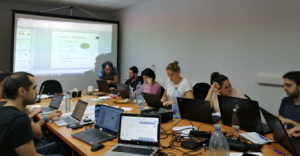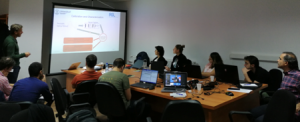University of Zurich promotes metrologically-rigorous data quality analysis at training workshop at INFLPR
Remote Sensing Laboratories (RSL), a unit made up of several departments of MetEOC partner University of Zurich, conducted a training workshop as part of MetEOC-3; in traceability chains, uncertainty propagation, and calibration/validation. The event was hosted by the Romanian National Institute for Laser, Plasma & Radiation (INFLPR).

The Intensive, week long, workshop promoted the application of principles of data quality, uncertainty propagation, and metrologically rigorous data quality analysis, by experts and young scientists. As such, it was a potentially highly impactful example of the added value of MetEOC projects for inspiring useful benefits for wider research communities.
Fostering best practices for harmonising and standardising approaches to data quality and uncertainty in the remote sensing community was one of the overarching objectives of MetEOC-3, and also MetEOC-4. Training researchers in calibration/validation (cal/val) and quality assessment, as well as integrating uncertainty and traceability in software for practical applications, was part-and-parcel of this effort.
The rigour of uncertainty analysis, and thorough understandings of the inherent underlying challenges, can be difficult to incorporate into projects when high-level theoretical material is usually the only readily-available source of information on uncertainty estimation and propagation. Such difficulties can discourage researchers and, so, limit the spread of FIDUCEO-inspired guidelines for data quality assessment.
From theory to practice
In this context, the COST action ‘Optical synergies for spatiotemporal SENsing of Scalable ECOphysiological traits’ (SENSECO), of which MetEOC-member Remote Sensing Laboratories (RSL, Geography Institute of the University of Zurich) is a part, organised the training school addressing traceability chains, uncertainty propagation and calibration/validation.
The one-week workshop was conducted in November 2019, at the Centre for Advanced Laser Technologies (CETAL), part of the Romanian National Institute for Lasers, Plasma, and Radiation Physics (INFLPR).
Guidance was provided:
- laboratory-based radiometric calibration and the corresponding uncertainty propagation equation, applied to field spectrometers
- uncertainty/variability propagation of field measurements to top-of-canopy radiances using radiative transfer models (RTMs).

The training school attracted experts and young scientists from SENSECO’s Work Group 1, which tackles the scaling gap between leaf and satellite measurements, and Work Group 4, which focuses on harmonising and standardising approaches to data quality and uncertainty across different scales, space and time.
Trainers provided a thorough examination of radiometric calibration by determining the measurement equation, via lectures and hands-on sessions including in the on-site calibration laboratory. In the latter half of the workshop, students learned to apply measurement uncertainty propagation from leaf to top-of-canopy scales by developing appropriate code alongside the use of radiative transfer models, such as PROSPECT.
The positive reception of the workshop suggests this training format could be replicated or expanded on in the future. It allowed for efficient (and intense) transmission of the principles of data quality and uncertainty propagation tailored to remote sensing, thereby encouraging the adoption of metrologically rigorous data quality analysis.
- Also, see Training courses developed in MetEOC.